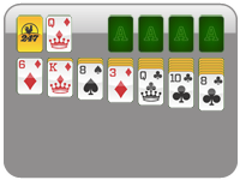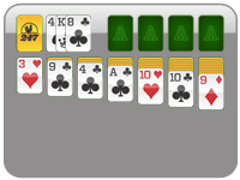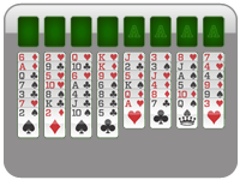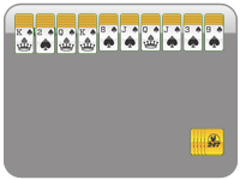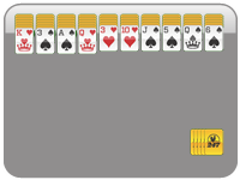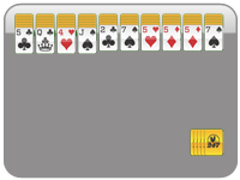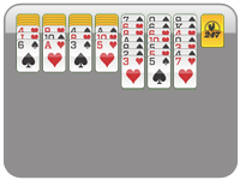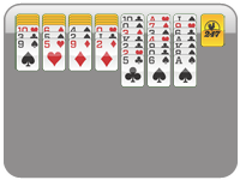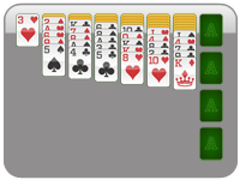What Can Freecell Solitaire Games Do for the Brain?

Freecell Solitaire games are a fun challenge and a great way to pass the time. But did you know that they also offer a whole host of brain-boosting benefits? Solitaire and other games offer a fun way to train your brain, benefiting cognition, memory, attention, and more.
In this article, we'll take a look at some of the top benefits of Freecell games for the brain, and suggest 5 of the best brain games for adults that you can play for free.
The benefits of card games for brain training

No matter what life stage you're at, everyone can benefit from the positive effects of Freecell card games and other board games. Here are some of the top brain benefits of playing card games like Freecell:
Cognition
Research shows that playing analog games can help prevent cognitive decline as we age. Not only are games a fun way to stimulate the brain, but the benefits compound over time. Making games a part of a daily routine can help to train your brain, and boost your cognitive skills over time.
Playing games that pit you against complex challenges, memorization, or mathematics can be just the exercise that our brains crave. Solitaire is a great example of this – and playing the popular card game has been shown to improve concentration and boost problem-solving skills.
Memory
Engaging our brain's memory capabilities regularly is important for maintaining healthy cognitive functioning. Card games like Freecell – as well as other card games, board games, and brainteasers – are a great way to test your memory and keep your brain active. While these games might seem simple at first glance, they involve multiple degrees of mentalization – players need to remember the state of the game, other player's hands, and the state of cards or pieces left on the board. These simple challenges can add up, helping to keep our memory engaged and our brains stimulated.
Socialization
Frequent socialization is recommended for those vulnerable to cognitive decline, such as seniors or those at risk of dementia. However, everyone can benefit from spending time with friends or family! Physical games are a great avenue for socialization, and they're usually relaxed enough that any player can keep up no matter their skill level. Who knows, you may even be able to meet new friends in your community by playing your favorite games! Consider joining a gaming community, or checking out a local board game cafe. And of course, there are endless possibilities to socialize and play solitaire games online!
The best brain games for adults

Freecell Solitaire isn't the only game to offer the benefits we outlined above. Each of the games on this list share many of the primary benefits listed above, as well as bringing their own unique challenges. Pick a game or two, and test your abilities!
Klondike Solitaire
Player count: Klondike Solitaire is best played with a single player.
What you'll need: To set up your own game of Klondike, you'll need a single pack of 52 playing cards. You can also play solitaire online!
Game length: The average game of Klondike Solitaire can take anywhere from 30-45 minutes to successfully complete.
How to play: To set up the game, you'll need to create a “tableau" of 28 cards – this will serve as your playing space. The tableau will consist of seven piles of cards which increase in size from one to seven cards. Start the game with the first card of each tableau pile face-up, and the rest face-down. Then, rearrange cards to reveal more cards and build your tableau.
Objective: The objective of Klondike Solitaire is to sort through the randomness of your tableau to build four “foundations". Stacks of cards arranged by suit in ascending value, from Ace to King.
Brain benefits: Some of the benefits of Solitaire games such as Freecell and Klondike are the usage of memory recall and strategic gameplay.
Sudoku
Player count: Sudoku is a classic numerical puzzle game usually played by one player.
What you'll need: Sudoku games can be commonly found all across the internet, in books, or in your local newspapers.
Game length: If you're savvy, sudoku games can be beaten in only 15 minutes, but you could easily spend your entire day mulling over a single game. Thankfully, Sudoku is easy to put down and pick up again, and doesn't need to be completed in one sitting.
How to play: Sudoku is often played in a 9x9 square grid. The aim of the game is to fill out the spaces of the grid with numbers ranging from one to nine. No numbers can repeat in any line, either horizontally or vertically. These are the most basic rules, though many Sudoku puzzles include squares that are pre-filled to challenge your approach.
Objective: Simply put, fill in the entire square with numbers and don't repeat any two in a single line. If you've accomplished this, you win!
Brain benefits: Some of the best benefits of playing Sudoku puzzles is the use of numerical thinking. It's not strictly a game which requires complex math, but you'll need to keep track of a lot of numbers in your head.
Chess
Player count: Chess requires two players, unless you fancy playing against yourself – which a lot of people do as practice!
What you'll need: You can find physical boxed chess sets in practically any games store, or you can play online.
Game length: A standard game of chess can take anywhere from 15 minutes to a full hour to complete.
How to play: Chess is played with two opposing players controlling an “army" of pieces. Your pieces each have unique methods of traversing the board. Taking enemy pieces and strategically defending your own is the key to success.
Objective: Your goal is to checkmate the opposing player's King, which means to place them in an inescapable deadlock position.
Brain benefits: Along with the natural cognitive benefits of socialization, chess is perhaps one of the most perfectly designed games to ever exist. Entire schools of study exist just to analyze the possibilities of a chess match. Playing chess will test your strategy, spatial awareness, and forward planning with each turn and movement. Some games even ask you to make all of your decisions under time pressure.
Spider Solitaire
Player count: Spider Solitaire is best played with one player.
What you'll need: To set up and play Spider Solitaire, you'll need two decks of 52 playing cards each, to make 104 cards in total. Or, you can play online!
Game length: The average game of Spider Solitaire can take anywhere from 30-45 minutes to successfully complete.
How to play: Double the cards and double the foundations, Spider Solitaire is a challenging off-shoot of the classic Klondike Solitaire ruleset. To set up the game, you'll need to create ten tableau columns, the first four of which contain six cards in total. One card of these face-up, and the remaining five face-down. The next six columns should contain five cards in total. One card of these face-up, and four remaining to place face-down. All remaining cards become your stockpile.
Objective: The objective of the game is the same as Klondike Solitaire. With strategy, memory, and patience, sort through your tableau to build eight foundational piles sorted by suit.
Brain benefits: Some of the benefits of this game are its challenge and the focus, commitment, and memorization required to play it. If you want a game that can absolutely pull you in for hours, while also testing your organizational skills and brain power, Spider Solitaire is one of the best around.
Word puzzles
Player count: Word puzzles such as crossword and wordsearch are most commonly played with one player, but you can also mull over them with friends!
What you'll need: You can find countless word puzzle games online or frequently in newspaper publications. All you need to play is a pencil and some time.
Game length: The average word puzzle can be completed in anywhere from 5 to 20 minutes.
How to play: Word puzzle games test your vocabulary and English knowledge by challenging you to extrapolate words based on context clues, such as their meanings or the arrangement of letters across a board.
Objective: Simply find the correct words and fill them out to win the game! Crosswords tend to see many larger words overlapping, which can complicate matters.
Brain benefits: It's always good to brush up on your vocabulary skills, and word puzzles are great exercises for those of us who cherish the written word.
Boost your brain health and play Freecell online!
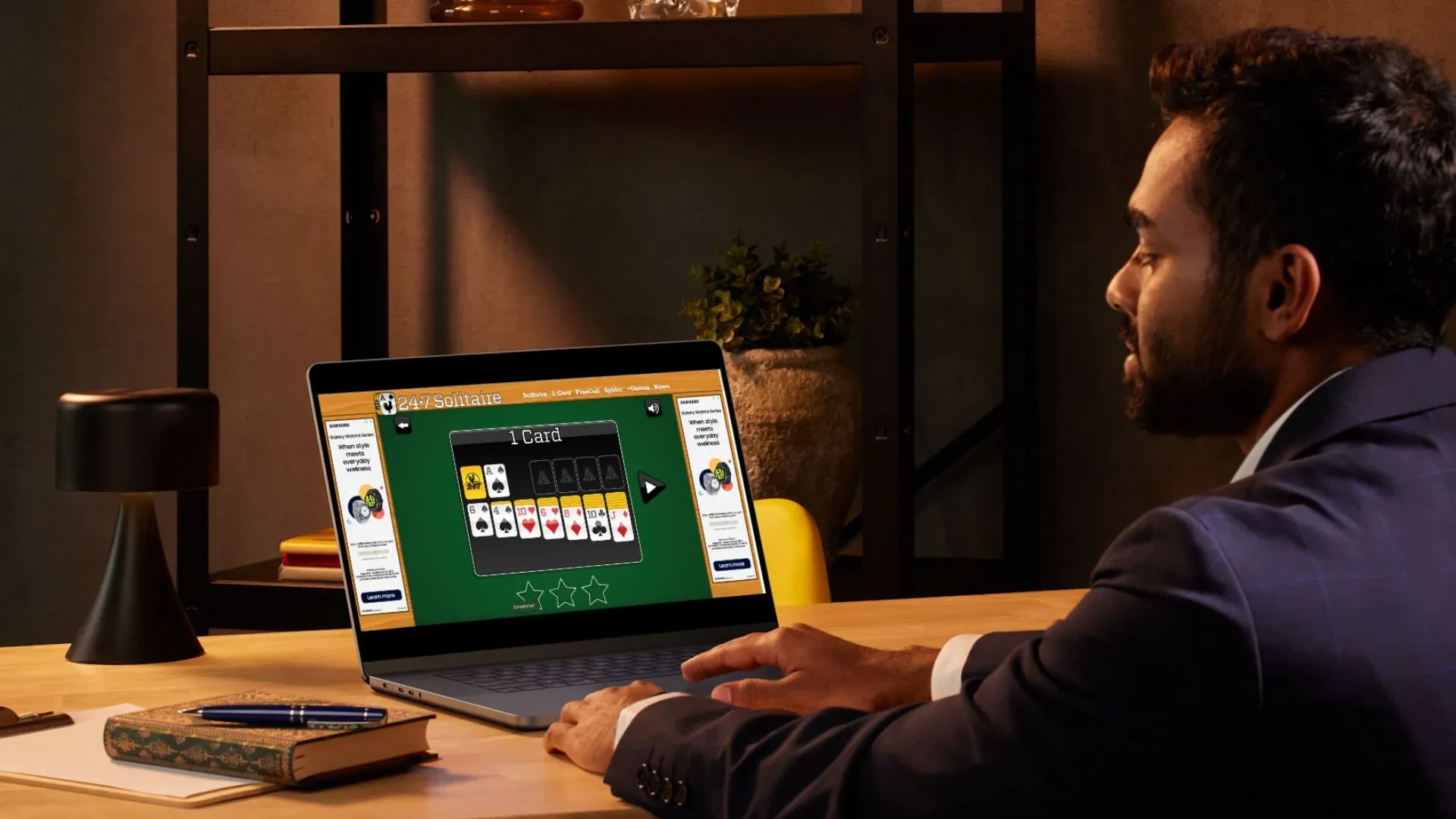
Hopefully you've found some new games to try out, or old favorites to return to. Taking care of your brain is important, so keep it happy and enriched with the best entertainment, good friends, and active stimulation!
If you'd like to visit the best collection of Solitaire games on the web, check out 247 Solitaire for their expansive library of the most popular Solitaire games on the web!
Solitaire Games
More Solitaire Games
More Games
Solitaire News
Disclaimer
DISCLAIMER: The games on this website are using PLAY (fake) money. No payouts will be awarded, there are no "winnings", as all games represented by 247 Games LLC are free to play. Play strictly for fun.

